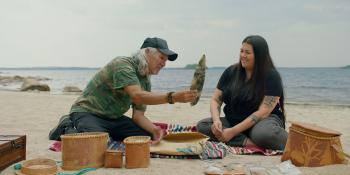Image Caption
Summary
Local Journalism Initiative Reporter
Windspeaker.com
Telling Our Story, a four-part docuseries about Indigenous people in the north and eastern Canada, is now available for free streaming on CBC Gem.
“It’s to rectify the one-sided history we learn, and that history we learn at school,” said Abenaki director Kim O'Bomsawin. “It’s important for Indigenous people to watch it as well so we can learn from it.”
Telling Our Story had its world premiere at the recent Toronto International Film Festival (TIFF), but showed only the first two episodes.
Now all four episodes can be viewed for free here: https://gem.cbc.ca/telling-our-story
Telling Our Story allows Indigenous people to tell their own stories from their own points of view. It features 11 Indigenous languages—Abenaki, Anishinaabe, Atikamekw, Cree of Eeyou Istchee, Innu, Inuit, Kanien'kehá:ka (Mohawk), Mi'kmaq, Naskapi, Huron-Wendat and Wolastoqiyik (Maliseet).
O'Bomsawin, and those who helped make the docuseries, travelled extensively between September 2020 and May of last year. They logged more than 30,000 kilometres and visited more than 30 Indigenous communities by car, plane, seaplane, helicopter, train, Ski-Doo, canoe, ATV and dog sled. They conducted more than 100 interviews.
O’Bomsawin, who lives in Montreal, was thrilled this effort resulted in the world premiere at TIFF.
She received an email this past June while vacationing in the state of Maine that said Telling Our Story would be included at the Toronto festival.
“I read it more than once because English is my second language,” O’Bomsawin said. “I wanted to make sure it was right.”
Telling Our Story was part of TIFF’s Primetime programming. This marked just the second year of the Primetime category.
“That’s why I didn’t know about it,” O’Bomsawin said. “Its purpose is to showcase television series from around the world.”
A total of nine series were featured in TIFF’s Primetime programming this year. Telling Our Story was one of three Canadian series in this grouping.
Each episode of the series is 44 minutes long.
“As an Indigenous director, this series is an exceptional opportunity for me to share with the world who we are, to participate in the decolonization of our history, and even to rewrite an inclusive, collective history,” she said.
“On a personal level, as an Abenaki, I was never able to learn the stories that we will tell you. I did not get the opportunity to discover them growing up. So, this is a personal quest, as much as it is a professional quest.”
The first episode in Telling Our Story is titled “Territory”, and it aims to educate viewers on the identities, beliefs and traditions of some Indigenous people.
“To understand who we are, you need to appreciate the special relationship we have with the land, a vast and immense territory that we shared amongst Nations,” reads a promotional synopsis of the episode. “It is an intimate and powerful bond that we want to keep alive. Let us tell you the story of the land, the beating heart of our identities, our beliefs, and our traditions.”
Episode two in the series is called “Identity”. It focuses on Indigenous languages and how they have been passed on through oral tradition for thousands of years.
The final two episodes in the series are titled “Spirituality” and “Rebuilding”.
The third episode includes the views that spirituality lives on despite attempts by governments and churches to erase Indigenous ceremonies and rituals.
And the final episode shows how Indigenous peoples are dealing with discrimination, governance, ecology and food sovereignty.
“This fight is critical,” reads an episode synopsis. “Our philosophy is simple: Make every political decision with a view to its impact on the next seven generations. This principle guided our ancestors and is why we are still here today to perpetuate it. Now, it will help us confront a global environmental crisis.”
Local Journalism Initiative Reporters are supported by a financial contribution made by the Government of Canada.

